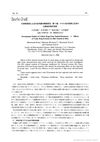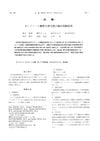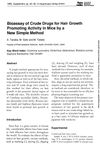Swertia Chirata Extract
Research
20 / 31 results
research Ancient-Modern Concordance in Ayurvedic Plants: Some Examples
Modern science supports the use of some Ayurvedic plants for health, as ancient practices suggested.

research An Educational Package on Lesser Known Herbal Medicines in India
An educational package was created to teach people about lesser-known herbal medicines in India.

research A Single Case Study on Ayurvedic Management of Hypothyroidism
Ayurvedic treatments may help reduce hypothyroidism symptoms.

research Ethnodermatological Use of Medicinal Plants in India: From Ayurvedic Formulations to Clinical Perspectives – A Review
Indian herbal medicine shows promise for treating skin diseases but needs more research to prove effectiveness.

research Formulation and Evaluation of Herbal Hair Serum in Treatment of Various Hair-Related Problems
Herbal hair serum with natural ingredients can effectively treat common hair problems.

research Adverse Reactions to Ethinylestradiol, Salicylic Acid, Swertia Japonica, and Tocopherol Acetate in Female Pattern Hair Loss Treatment
Two women had skin reactions from a hair loss treatment and got better after stopping use.

research Development Studies of Cuticle Drugs from Natural Resources: Effects of Crude Drug Extracts on Hair Growth in Mice
Certain natural extracts can promote hair regrowth.

research Hair Loss and the Applied Techniques for Identification of Novel Hair Growth Promoters for Hair Regrowth
Many products for hair re-growth exist, but a perfect treatment without side effects has not yet been found.
research Promoting Effect of Herbal Extract Mixtures on Hair Regrowth in C3H/HeJ Mice
Herbal extracts can help hair regrowth and may treat hair loss.

research Clinical Evaluation of Hair Regrowth Tonics Containing Oleanolic Acid
The hair regrowth tonic effectively increased hair count and was safe for treating male pattern baldness.

research Stereocontrolled Synthesis of All Eight Stereoisomers of the Putative Anti-Androgen Cyoctol
Scientists made all eight versions of a compound called cyoctol, but found it's not an anti-androgen and it fully breaks down in the skin.

research Wound Healing and the Use of Medicinal Plants
Some medicinal plants can help heal wounds and may lead to new treatments.

research Mechanism of Action of Herbs and Their Active Constituents Used in Hair Loss Treatment
Some herbs and their components might help treat hair loss by affecting various biological pathways, but more research and regulation are needed.

research Hair Growth: Focus on Herbal Therapeutic Agents
Some plants may help with hair growth and have fewer side effects than synthetic drugs, but more research is needed to confirm their effectiveness.

research Topically Used Herbal Products for the Treatment of Hair Loss: Preclinical and Clinical Studies
Herbal products might promote hair growth with fewer side effects, but more research is needed to confirm their safety and effectiveness.

research Interventions for Female Pattern Hair Loss
Topical minoxidil helps treat female pattern hair loss, but more research needed for other treatments.

research Bioassay of Crude Drugs for Hair Growth Promoting Activity in Mice by a New Simple Method
Some natural extracts and one hair tonic can promote hair growth in mice.

research In Vivo and In Vitro Hair Growth-Promoting Effect of Silver and Iron Nanoparticles Synthesized via Blumea Eriantha DC Plant Extract
Silver nanoparticles can significantly promote hair growth.

research Proteomic Analysis of Balding and Non-Balding Mesenchyme-Derived Dermal Papilla Cells from Androgenetic Alopecia Patients Using Online Two-Dimensional Reversed Phase-Reversed Phase LC-MS/MS
Found different proteins in balding and non-balding cells, giving insight into hair loss causes.

research The Use of Plants in Hair and Scalp Preparations
Plant-based ingredients in hair care are being replaced by synthetic alternatives.